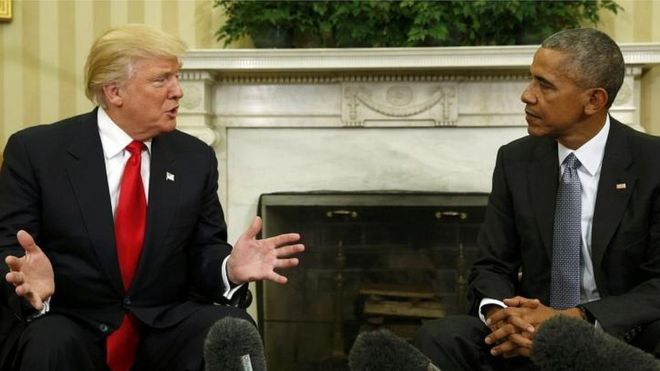
At 8 p.m. on election night at St. Mary’s Episcopal Church in Foggy Bottom, the Rev. Father Bernard Anderson led a small gathering in prayer for the soon-to-be president-elect. They asked that the new president lead the country with strength and compassion, represent the best of the United States around the globe, be committed to justice and peace, and bring our nation together to address our challenges.
A few hours later, Donald Trump was elected the nation’s 45th chief executive.
God must have a sense of humor to put up with what we do to ourselves.
Or maybe the election was used to teach us some lessons — about ourselves.
We learned election night, if we didn’t already know it in our heart of hearts, that we are not the inclusive, multiracial and multicultural country we make ourselves out to be. Despite projecting the image of a United States embodying a kumbaya-like spirit of human unity, our identities are rooted in race, religion and ideology. That showed up in the election returns. It could be seen in the faces of Trump’s core constituencies.
And don’t think of them as only old, Rust Belt, blue-collar supporters.
White people made Trump president.
He ran the table in virtually all categories, including college- and non-college-educated white men, and whites 18 to 29 years old.
Hillary Clinton’s camp, in contrast, consisted of a polyglot of colors, religions, sexual orientations and college-educated white women.
The sound of joyful exclusion could be heard in the voice of David Duke, the white nationalist former Ku Klux Klan leader who called Trump’s electoral victory “one of the most exciting nights of my life.” “Make no mistake about it, our people have played a HUGE role in electing Trump,” Duke tweeted .
You have to wade through the euphemisms to see what Duke is getting at.
The Post described voters drawn to Trump as “Americans alienated by the forces of globalization and multiculturalism and deeply frustrated with the inability of Washington to address their needs.”
They were depicted this way in the New York Times: “A largely overlooked coalition of mostly blue-collar white and working-class voters who felt that the promise of the United States had slipped their grasp amid decades of globalization and multiculturalism.”
Ah, those words: “globalization and multiculturalism.”
The Rev. Jesse Jackson, confronted with rising opposition to school busing, famously observed: “It ain’t the bus, it’s us.”
Drop the “globalization and multiculturalism” genteelism.
Call it what it is.
It’s low-skilled brown people from Mexico showing up in the job market and competing with low-education white folks. It’s non-Christian immigrants — yes, those Muslims — and illegal immigrants who have “our people” fearfully looking over their shoulders and, in some cases, down their noses.
It’s lazy black people given everything by Washington, including the social advantages that white folks alone used to enjoy.
It’s “crooked” Hillary Clinton and the prospect of her and Bill back in the White House working along with white liberal know-it-alls and international banks to plot the destruction of U.S. sovereignty — and not multiculturalism — that sent voters flocking to the polls for Trump.
It’s the illegitimate President Obama, that secret Muslim born in Kenya, who supports the LGBT agenda, favors putting boys in girls’ locker rooms, promises entitlements to the undeserving, governs by executive order — and not globalization — that made them vote for Trump.
It is us — the resentment of us, along with all of the above, that stoked the powerful movement that materialized Election Day.
It is us, and from us, that they want to take back America — as if we ever had it.
Trump’s unexpected victory offers a teachable moment to learn what we should already have known.
In the weeks leading up to the election, I couldn’t believe my ears: College professors from Georgetown and Howard universities recounting tales of African American students who look down on voting — “doesn’t make a difference”; “politicians don’t listen”; “no reason to hope, since Obama’s ‘hope and change’ changed little.”
And this one on Election Day: The lines were too long.
The Rev. Martin Luther King Jr. said becoming a registered voter is a “sacred right” — among “the highest mandates of our democratic traditions.”
“So long as I do not firmly and irrevocably possess the right to vote I do not possess myself,” he declared. “I cannot make up my mind — it is made up for me. I cannot live as a democratic citizen, observing the laws I have helped to enact — I can only submit to the edict of others.”
Many African Americans didn’t vote, at least not like they did in 2008 and 2012, when Obama was on the ticket. That helped produce President-elect Donald “Grab them by the p—y” Trump.
Not voting is a failure of citizenship. But recalling our St. Mary’s prayer and King’s embrace of voting as a sacred right, not voting was also a sin.
That, too, is a teachable moment we will have four long years to ponder.



Expositores: Oscar Vidarte (PUCP) Fernando González Vigil (Universidad del Pacífico) Inscripciones aquí. Leer más
Una retrospectiva para entender los próximos cuatro años. Leer más
En la conferencia se hará una presentación de los temas más relevantes del proceso de negociación se llevó a cabo desde el 2012, así como del acuerdo de paz firmado entre el Gobierno colombiano y la guerrilla de las FARC a finales del 2016. Se analizarán los desafíos y las... Leer más
El Observatorio de las Relaciones Peruano-Norteamericanas (ORPN) de la Universidad del Pacífico es un programa encargado de analizar y difundir información relevante sobre la situación política, económica y social de Estados Unidos y analizar, desde una perspectiva multidisciplinaria, su efecto en las relaciones bilaterales con el Perú.
© 2024 Universidad del Pacífico - Departamento Académico de Humanidades. Todos los derechos reservados.

